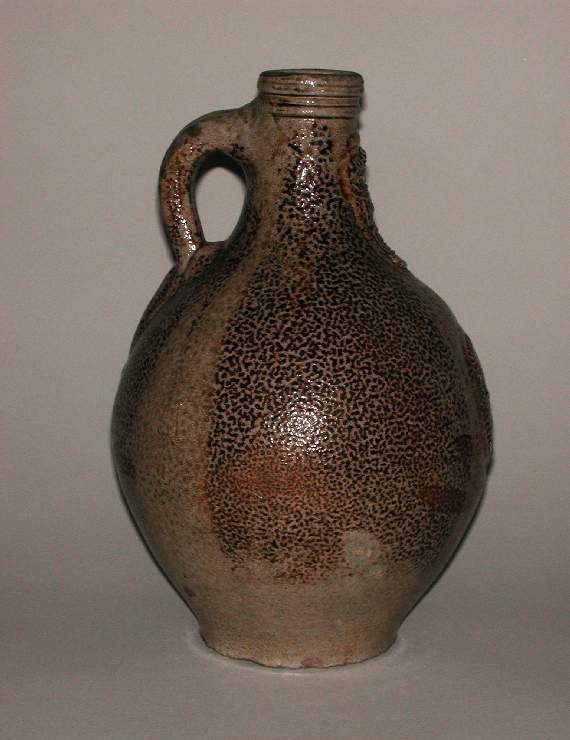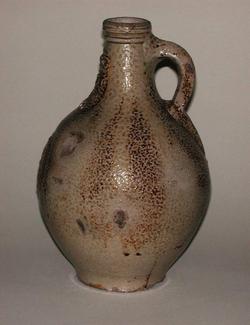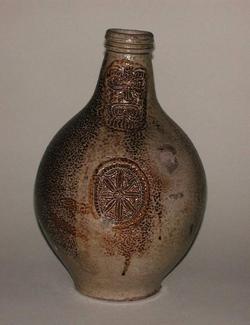Awaiting location update
Maker(s)
Production:
Unidentified Frechen pottery
Entities
Categories
Description
Brown salt-glazed stoneware with applied bearded face mask and oval medallion containing an eight-petalled flower
Grey stoneware, thrown, with applied handle, moulded relief decoration, and uneven iron-brown wash, under coarse mottled salt-glaze. The jug has an elongated bulbous body contracting at the top into a short narrow neck with cordons round the mouth, and a small strap handle. On the front of the neck is a crude bearded face mask in relief, and below it an oval medallion with a raised edge containing an eight-petalled flower with spots between the petals. The brown wash is much darker and more thickly applied on one side than the other, which has a wide vertical streak of mottling on a paler surface.
Notes
History note: Mr Powell, Cambridge, from whom bought in 1893 by Dr J.W.L. Glaisher, FRS, Trinity College, Cambridge
Legal notes
Dr J.W.L. Glaisher Bequest
Measurements and weight
Diameter: 18.8 cm
Height: 28 cm
Acquisition and important dates
Method of acquisition: Bequeathed
(1928-12-07)
by
Glaisher, J. W. L., Dr
Dating
17th Century, second half
Circa
1650
-
1680
Note
A bearded mask jug in the Victoria and Albert Museum has an almost similar medallion containing an eight petalled rosette (inv. 713-1908). See also Fitzwilliam Museum C.2019-1928.
The German term for salt-glazed stoneware jugs with bearded masks below the rim is Bart¬mann or Bartmannkrug (bearded man jug). They were produced in vast quantities at Frechen during the second half of the six¬teenth and seven¬teenth centuries, in a range of different sizes for domestic or commer¬cial purposes. They were exported to England by Dutch merchants through ports in the Netherlands, and were widely distributed and used until the late 17th century when the manufacture of salt-glazed stoneware and glass bottles was developed here. The German stoneware jugs became known as `Bellar¬mines' reputedly after Cardinal Roberto Bellarmino (1542-1621) whose reforming zeal made him unpopular in Protestant states. The term was first mentioned in William Cartwright’s comedy 'The Ordinary', (1634), and by the 19th century this had become a common collectors' term for these bottles.
Components of the work
Surface
composed of
iron-brown wash
( or 'dip')
salt-glaze
Base
Body
Decoration
Materials used in production
grey
Stoneware
Techniques used in production
Salt-glazing
References and bibliographic entries
Identification numbers
Accession number: C.2020-1928
Primary reference Number: 76574
Old object number: 683
Stable URI
Audit data
Created: Saturday 6 August 2011
Updated: Tuesday 26 March 2024
Last processed: Tuesday 15 July 2025
Associated departments & institutions
Owner or interested party:
The Fitzwilliam Museum
Associated department:
Applied Arts






